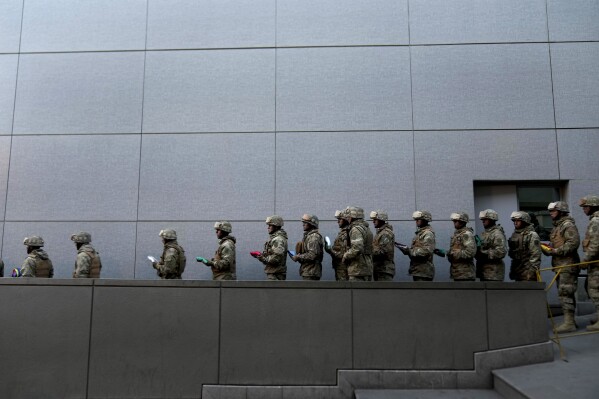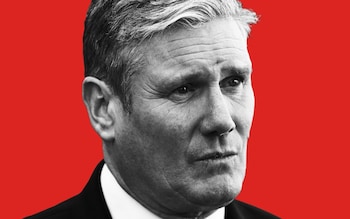It was 13 degrees below zero in Skellefteå in Sweden’s far north.
Arvid Öhgren, a contractor at Northvolt’s battery factory, tried to pull himself off the freezing ground.
He looked down and with his right hand tried to pick up his left arm. The limb was hanging by a thread of skin.
A sudden crane accident moments before had killed his co-worker, a man in his 60s.
As he waited for an ambulance, a panicked security guard said to Mr Öhgren: “It’s just a small fracture.”
“I didn’t really think much about the fact that the arm wasn’t there anymore,” he told Noran, Skellefteå’s local newspaper.
“All I really felt was that it hurt a hell of a lot.”
Mr Öhgren lost his arm and suffered a crushed foot.
This is just one of a series of tragic events to have plagued Northvolt, the Swedish battery start-up and European technology champion, in recent months.
As well as the death of Mr Öhgren’s co-worker on December 14 last year, another 25-year-old employee died as a result of an explosion on November 4.
Following news of the deaths, Peter Carlsson, the former Tesla executive leading Northvolt, said in December it was a “dark day” for the company.

Since his remarks, reports have emerged that police are investigating three further “mystery” deaths linked to the factory.
In January a 33-year-old cleaning worker died shortly after his shift, while a month later a 19-year-old employee died at home in bed.
This month a 59-year-old was also found dead on his balcony.
A Northvolt spokesman said: “It is tragic that three colleagues have passed away and our thoughts are with the families.”
In a further bizarre twist, it emerged last week that Northvolt’s chairman, Jim Hagemann Snabe, has been on sick leave since the start of the year after cutting himself open-water swimming in January.
He told Denmark’s Borsen newspaper that the cut resulted in a severe infection that required several operations.
The accidents and unexplained deaths have cast a shadow over Northvolt, which has raised over $13bn (£10.27bn) to build a European battery giant to take on China.
Founded in 2015 Northvolt markets its Skellefteå site – located just shy of the Arctic Circle – as “Europe’s first homegrown battery factory”.
Powered by renewable energy from a hydroelectric plant, it is seeking to sell lithium-ion batteries that reportedly have a 90pc lower carbon footprint than leading rivals.
It has also pledged to recycle the vast majority of its components and “close the loop” on the rare materials – such as manganese and nickel – used to make batteries.
EU-made batteries present an alternative to those exported from China, which often carry political risk and dubious green credentials.
Carmakers such as BMW, Siemens, Scania and Volkswagen have placed orders with Northvolt to the tune of $50bn.
Growing demand has allowed Northvolt to rapidly expand its operations, with plans to create thousands of jobs via new battery factories in Germany and Canada.
It has also attracted heavy-weight investors such as Blackrock, Goldman Sachs and Baillie Gifford.
Faith in the business led to it securing a $5bn loan from a consortium of banks earlier this year, including $1bn in financing from the European Union.
This has also fuelled reports of a potential $20bn stock market listing in 2025, which would propel the company beyond its current $12bn valuation.
However, despite raising vast sums of cash and enjoying generous support from Brussels, recent obstacles have shown the scale of the task ahead.
Whether that will be slowing demand for electric cars or the overall complexity of its product, Northvolt is battling hard to maintain momentum.
Simon Moores, chief executive of Benchmark Mineral Intelligence, says the concept of relying on recycled materials was a “big win” for European car brands against Chinese batteries.
“The need to be green was paramount to the entire concept of electric cars and gigafactories in Europe,” he says.
But the key barrier is that “making sustainable, quality lithium-ion batteries is hard”.
As proof of this he claims it took “Tesla and Panasonic the best part of a decade” to get their shared battery facility in Nevada functioning properly.
Recent setbacks at Northvolt’s site in Sweden have led to some of its biggest customers not receiving batteries on time.
Scania, the Volkswagen-owned truck maker, was forced to slow the roll-out of its fleet of electric HGVs amid delays to expected deliveries of Northvolt batteries.
Northvolt subsequently sought to ease concerns by claiming in June that it was producing 16,000 cells per week.
However other customers appear to have run out of patience.
Earlier this month BMW reportedly pulled out of a €2bn (£1.69bn) contract for Northvolt batteries after it fell behind schedule.
The deal represents less than 5pc of the company’s order book.
In a statement Northvolt and BMW said the companies had “jointly decided to focus Northvolt’s activities on the ambition of developing the next generation of battery cells”.
Industry sources say the company’s production woes are well-known in the sector.
“It isn’t a huge surprise,” a source says.
“They’ve obviously done incredibly well at raising capital, but we have known for a while Northvolt has had issues scaling.”
A key challenge for battery companies is getting their production lines optimised so the cells they produce have minimal defects.
James Frith, European head at Volta Technologies, says: “It is clear that the company has faced problems producing high-quality cells at acceptable yields.”
The delays “may well slow down some of the company’s aggressive expansion plans to refocus on the basics,” says Andy Leyland, co-founder of supply chain analysts SC Insights.
“Production at Northvolt Ett has improved significantly,” a spokesman said, “and production rate has increased from thousands of cells per week to tens of thousands.”
It is not just in Sweden where Northvolt has faced hurdles.
In Canada, where the company is planning a 30GW battery plant near Quebec, local eco-activists have targeted the company despite its green credentials.
In January vandals buried nails in trees that the company planned to fell, creating a risk to workers trying to clear them.
In May incendiary devices were also found hidden on the construction site.
More broadly Northvolt must contend with the wider shocks to the electric vehicle sector, which is grappling with a slowdown in demand in Europe and a flood of new competitors from China.
Still, the threat from the Far East could help solidify investor and government support for Northvolt which promotes itself as being Europe’s only large-scale battery start-up.
“Without Northvolt, the EU will be reliant on battery supply from China and Asian cell suppliers,” says Mr Moores.
Mr Carlsson previously told Manager Magazin he believed the company was “past the point where we could fail like a start-up” by running out of cash.

Skellefteå is a town of just 74,000 people which at this time of year basks in more than 21 hours of daylight.
Authorities sought to ease worries on June 27 as they said there was “no concrete connection” between the deaths nor “suspicion of crime”.
However the investigation remains live: “As the three deaths have similarities and the people worked at the same workplace, the workplace is also an aspect that is looked at in the investigation.”
One line of questioning has already been opened into whether “one of the persons may have been exposed to a substance at their workplace”, the police said.
Unsurprisingly the deaths have also raised concerns among those on the factory floor.
But union officials at IF Metal said they “welcome the investigation and want to be able to rule out that the deaths have anything to do with Northvolt”.
As for the company itself, Northvolt said its internal investigations “did not indicate any accidents or exposure of toxic materials for the individuals”.
A spokesman added: “These facts collectively suggest this is a tragic coincidence.
“We will of course support the investigation in any way we can.”
Disclaimer: The copyright of this article belongs to the original author. Reposting this article is solely for the purpose of information dissemination and does not constitute any investment advice. If there is any infringement, please contact us immediately. We will make corrections or deletions as necessary. Thank you.



